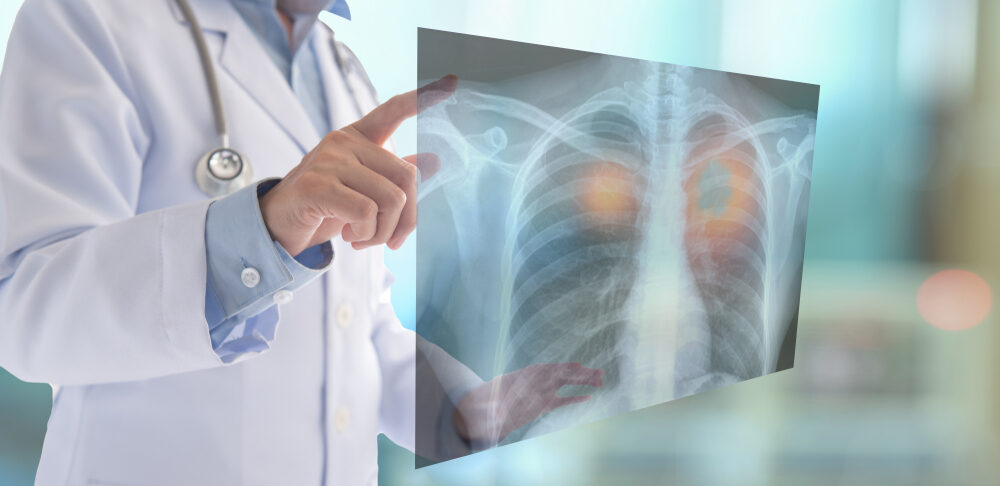
☝️ The most important facts in brief
- Pulmonology is a branch of internal medicine.
- The term "pneumology" is often used synonymously.
- The lungs and airways are the subject of this specialist area.
- Diseases that pulmonologists are frequently confronted with include asthma, COPD and lung cancer.
- The salary of pulmonologists is in the upper range compared to other medical fields.
📖 Table of contents
Pulmonology encompasses the diagnosis and treatment of lung diseases such as asthma and COPD. This speciality is also known as pneumology or pulmonology and deals with a wide variety of lung diseases. In order to specialise in this field, you will need a degree in medicine and specialist training in internal medicine.
Are you interested in studying medicine?
We will be happy to advise you free of charge about your options for studying medicine, including advice on studying medicine in another EU country, which is fully recognised in Germany.
What exactly is pulmonology?
The word "pulmonology", sometimes also referred to as "pulmonology", is derived from the Latin "pulmo" (= lung). Alternatively, the term "pneumology" or "pneumonology" is often used for this speciality, which comes from the Greek "pneuma" (= air, breath, spirit, breath).
As the name suggests, pulmonology specialises in diseases that affect the airways and bronchi. The aim is to diagnose these diseases correctly and as early as possible and then treat them effectively.
Common diseases and symptoms in pneumology
Pulmonology is diverse, but some diseases are particularly common here:
- COPD is one of the most common diseases in pulmonology. It leads to a permanent narrowing of the airways and makes breathing difficult. Smoking is the main trigger for COPD.
- Asthma is a chronic disease of the lungs that often begins in childhood. It causes breathlessness, coughing and wheezing noises. It is treated with medication and respiratory therapy.
- Pneumonia is an infection of the lungs. It leads to symptoms such as coughing, fever and breathlessness. Rapid diagnosis and treatment are crucial here.
- Lung cancer is a serious disease that is often only discovered at an advanced stage. Smoking is also the main factor here. Examinations such as X-rays and biopsies are necessary for the diagnosis.
Typical symptoms of patients in pneumology
The most common symptoms in pulmonology include cough, shortness of breath and chest pain. These symptoms should not be ignored as they can indicate serious illnesses. Early diagnosis and treatment are important in order to improve quality of life and avoid complications. With a specialised team, pneumology ensures that patients receive comprehensive care and the highest level of treatment.
Diagnostic means and examination methods in pneumology
Pulmonology patients are first given a detailed medical history and a physical examination by the doctor. This serves to obtain initial indications of possible diseases of the lungs and airways. Another important tool in pulmonology is the lung function test. This measures how well the lungs are working and can provide indications of diseases such as asthma or COPD.
Imaging procedures are also essential in pneumology. X-rays, CT scans and MRIs provide detailed images of the lungs and help to detect tumours, inflammation or other abnormalities. Such examinations are often the key to an accurate diagnosis.
Blood tests and other laboratory tests supplement the diagnostic methods. They can determine inflammation markers, blood gas levels and other parameters that indicate specific diseases.

Becoming a pulmonologist - the necessary steps
If you are interested in pulmonary medicine and would like to specialise accordingly, you have a long road ahead of you. The first step is the 6-year degree programme in human medicine. Although you will also learn a lot about the lungs here, you will not yet specialise in one area. Rather, the aim is to deal intensively with all aspects of the human body and possible disorders.
The degree programme concludes with the state examination. You can then work as an assistant doctor at a clinic and train as a specialist during this time.
Pulmonologists are specialists in internal medicine
Before you can specialise in pulmonology, you must first begin specialist training for internists. This takes 5 years and allows you to increasingly specialise from about halfway through. Once you have completed your specialisation, you are an internist. Whether you are also a pulmonologist by definition depends on your additional qualifications.
Fields of activity for pulmonologists
Many pulmonologists work as specialists in large clinics, for example at a university hospital. However, you also have the option of setting up your own practice.
Further career opportunities are available in research or in the healthcare sector. If you also do further training in the Surgeryyou can specialise in lung surgery.
Career and salary: What does a pulmonologist earn?
The decision to become a pulmonologist should not be made solely for financial reasons. Nevertheless, salary plays an important role in choosing a career. Here is an overview of salary trends on the path to becoming a pulmonologist and beyond.
During medical school
There is no remuneration during medical studies. Students have to pay their own tuition fees and living expenses. Many therefore opt for part-time jobs to cover these costs. Becoming a doctor therefore requires considerable financial and time investment, without any immediate financial benefits.
During specialist training
During specialist training as a pulmonologist, trainee doctors work as assistant doctors in clinics. The salary of an assistant doctor in Germany varies depending on the collective agreement and clinic, but averages between 4,500 and 5,500 euros gross per month. The salary can increase as training progresses and experience grows.
As a trained specialist in pulmonology
After completing specialist training, the salary increases significantly. Salaried pulmonologists in German clinics earn on average between 7,500 and 9,000 euros per month. This salary can vary depending on the area of responsibility and professional experience.
Self-employment and own practice
Pulmonologists who open their own practice have the potential to earn even more. The income here can be significantly higher, depending on the number of patients and the efficiency of the practice management. However, there are also higher risks and costs associated with self-employment, such as practice maintenance, staff salaries and administrative tasks.
Comparison and perspective
Compared to other medical specialities, the salary of pulmonologists is in the upper range. The salary is attractive and offers solid long-term financial prospects. However, it is important to remember that working as a pulmonologist can be fulfilling not only financially, but also professionally and personally.
Overall, the profession of pulmonologist offers attractive salary prospects and a rewarding career that includes both professional challenges and the opportunity for personal development.
Free information material
Studying medicine abroad 🎉
Order your info pack now, find out more about the Studying medicine abroad and get started as a medical student!





